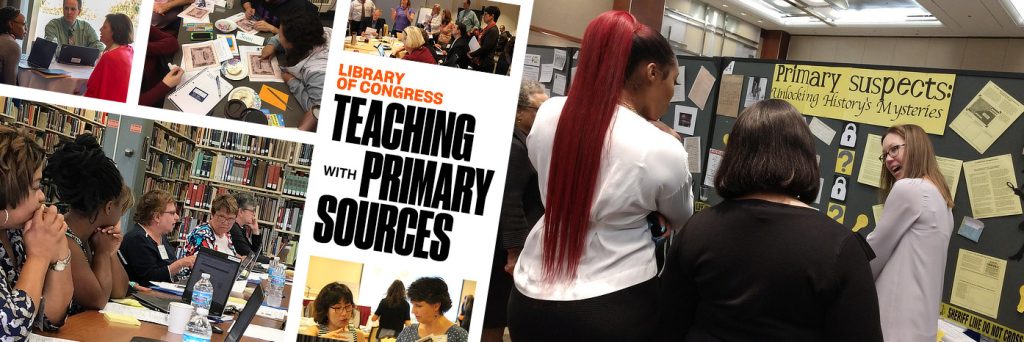We spoke with Lia Atanat, our Maryland Historical past Day Outreach & Skilled Growth Coordinator, about our new collaboration with tribal consultants and lecturers in creating inquiry kits in regards to the Indigenous historical past and tradition of the land now referred to as Maryland.

Q: Might you shortly describe the inquiry kits for our readers?
A: Certain! The inquiry kits are on-line units of historic sources that each one pertain to a sure, particular subject. We began creating them in 2016 with funding from a Library of Congress Instructing with Major Sources grant.
The kits have confirmed to be helpful for college kids on the lookout for analysis matters, and for lecturers trying to introduce a category unit or observe main supply evaluation abilities with their college students. They cowl matters like landmark court docket circumstances, necessary historic phenomena just like the Civil Rights Motion, but additionally lesser-taught histories like Queen Lili’uokalani of Hawai’i.
Q: What first sparked the thought for these new inquiry kits?
The Indigenous Maryland Inquiry Equipment challenge grew out of a collaboration with numerous different organizations who’re all on the lookout for methods to get native Indigenous sources and tales out to lecturers, college students, and the broader group.
It actually began with the Maryland State Archives (MSA), who final yr revealed the Mayis Indigenous Data, a web based database that can include transcriptions of the entire data of their collections that point out Indigenous folks and place names. They reached out to native organizations just like the Maryland State Division of Training (MSDE), the Maryland State Arts Council, the Chesapeake Bay Maritime Museum, amongst others, to search out methods to make their data extra accessible to lecturers.
We already had this nice platform for contextualizing and sharing supply units with lecturers, so the thought got here collectively organically from there.
Q: What are the outreach staff’s hopes for this collaboration and last product?
A: We hope that these kits will contribute to a revision in the way in which the historical past of Native Nations has been taught till lately—as folks relegated to the earliest years of the historical past of European colonization, as individuals who made much less contributions to historical past than European colonists, and as minor gamers in Maryland and US histories.
MSDE has lately revised their social research requirements to incorporate Indigenous Maryland historical past and tradition, and we hope to align with their imaginative and prescient of inclusion. One of many necessary takeaways, so simple as it sounds, is that there are nonetheless Indigenous folks in Maryland, who are sometimes disregarded of the dialog about native historical past, heritage, and tradition.

Q: Are you able to speak about your work with English Language Learners and the way this relates?
A: We’ve been striving to make our work with Historical past Day and the inquiry kits accessible to the rising inhabitants of English learners within the state. A big proportion of these English learners have Indigenous Latin American background. Despite the fact that their background will typically not embody native Maryland tribes, we hope that inclusion of indigenous views may even be significant to these college students, by way of solidarity with different Indigenous identities and a shift in how the curriculum portrays colonized folks.
Q: How are you working with tribal leaders? Have you ever discovered something thus far about working with them?
A: For this challenge, native tribal leaders and group members will work with us as paid consultants to make sure that the brand new kits painting Indigenous tradition and historical past with accuracy and respect. The tribal leaders I’ve labored with thus far, who embody members of the Nause-Waiwash Band and Pocomoke Nation, have expressed how tough it’s to get younger folks engaged with Indigenous communities, cultures, and tales. They’re open to exploring new codecs and digital media that children will discover accessible and interesting, and that features youth in their very own communities. I believe the brand new inquiry kits will slot in properly with that imaginative and prescient, and along with making their tales extra broadly accessible, they’ll assist to equip communities with a curriculum growth software to go down their tales to new generations of tribal members.
Q: How are you collaborating with lecturers?
A: MSA and MSDE ran a workshop this summer season to offer coaching to lecturers in native Indigenous tradition and historical past. The individuals spent 4 days studying tips on how to discover and use Indigenous historic sources, they discovered in regards to the Mayis database, they attended classes led by tribal leaders and members, they visited websites related to Indigenous tradition and historical past, and so they created lesson plans to deliver that new information to their lecture rooms. We plan to recruit our equipment creators from among the many lecturers who participated in that workshop. It will enable us to be selective and be sure that the brand new kits align with our targets and our tribal consultants’ requests. We additionally know that having lecturers create the kits will be sure that they’re helpful to different lecturers.
Q: What sort of skilled growth sources are you planning for lecturers?
A: We’re planning to create a instructor information module that can introduce lecturers to the Indigenous MD equipment assortment, together with what varieties of sources they may encounter within the kits, tips on how to use them, how the kits align with the brand new social research curriculum, and the place to be taught extra about Indigenous histories and communities in Maryland. We all know that almost all of social research educators don’t have intensive coaching in Indigenous historical past, so we plan to incorporate a bibliography that can assist present background information to show these classes.
Along with that digital useful resource, yearly the MHD outreach employees provide to carry workshops for lecturers at their August district in-service days. Subsequent August, along with our ordinary workshops on Historical past Day and the broader physique of inquiry kits, we’d like to carry some classes to introduce the brand new Indigenous MD kits.
Q: What influence are the inquiry kits basically having? What responses are you listening to from lecturers and college students?
A: Yearly, the outreach staff introduces the inquiry kits to college students within the classroom, to lecturers throughout Maryland, and we even current them to educators at nationwide conferences. Lecturers admire the methods most of the kits align with items they educate, making it straightforward for them to seize a set of sources to make use of within the classroom. College students, however, admire that the vary of matters covers a broad number of curiosity areas – a pupil who isn’t serious about conventional historical past matters may discover our kits referring to sports activities, the humanities, or science and it may possibly open the way in which for them to get serious about doing analysis. I see this extending to the brand new assortment of kits as properly – the tales of Indigenous folks that we’ll inform is not going to simply be the conflicts and treaties that they had with Europeans; they’ll contact on environmental science, craft, and lifeways, lots of that are nonetheless carried on or nonetheless have an effect on folks in Maryland.
Q: Is there anything you want to add?
A: I’d simply say that I’m actually happy by the quantity of collaboration that has already gone into this challenge and that can go into it within the coming yr. There are such a lot of state and native organizations who we’re proud to be working with, in addition to tribal leaders, lecturers, and extra. Working collectively, we’re capable of accomplish a lot extra and elevate the voices that need to be elevated. And once more, we thank the Library of Congress for supporting our resolution to shift our focus to have the ability to try this.
The Library of Congress’ Instructing with Major Sources Program will fund the Indigenous Maryland Inquiry Kits.
